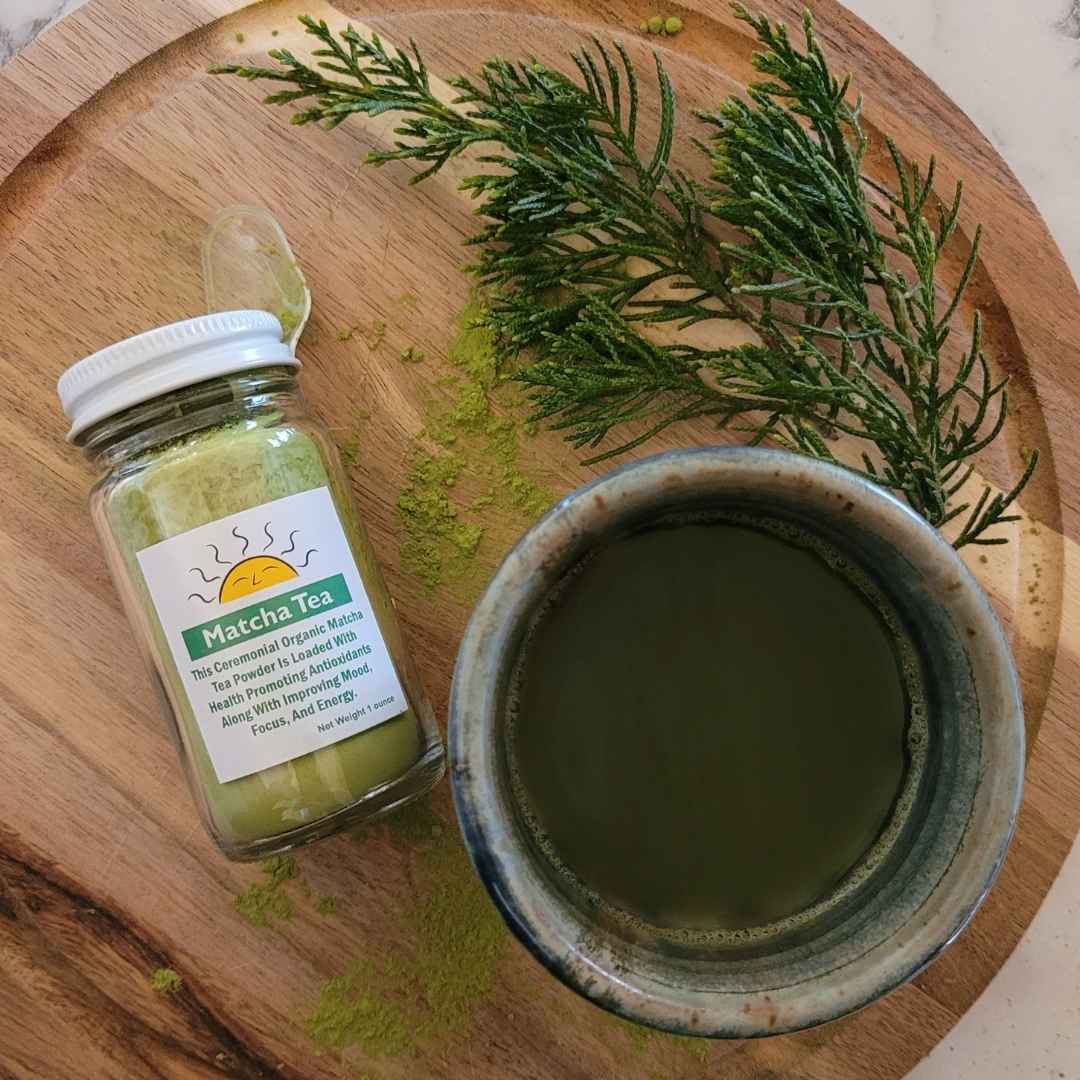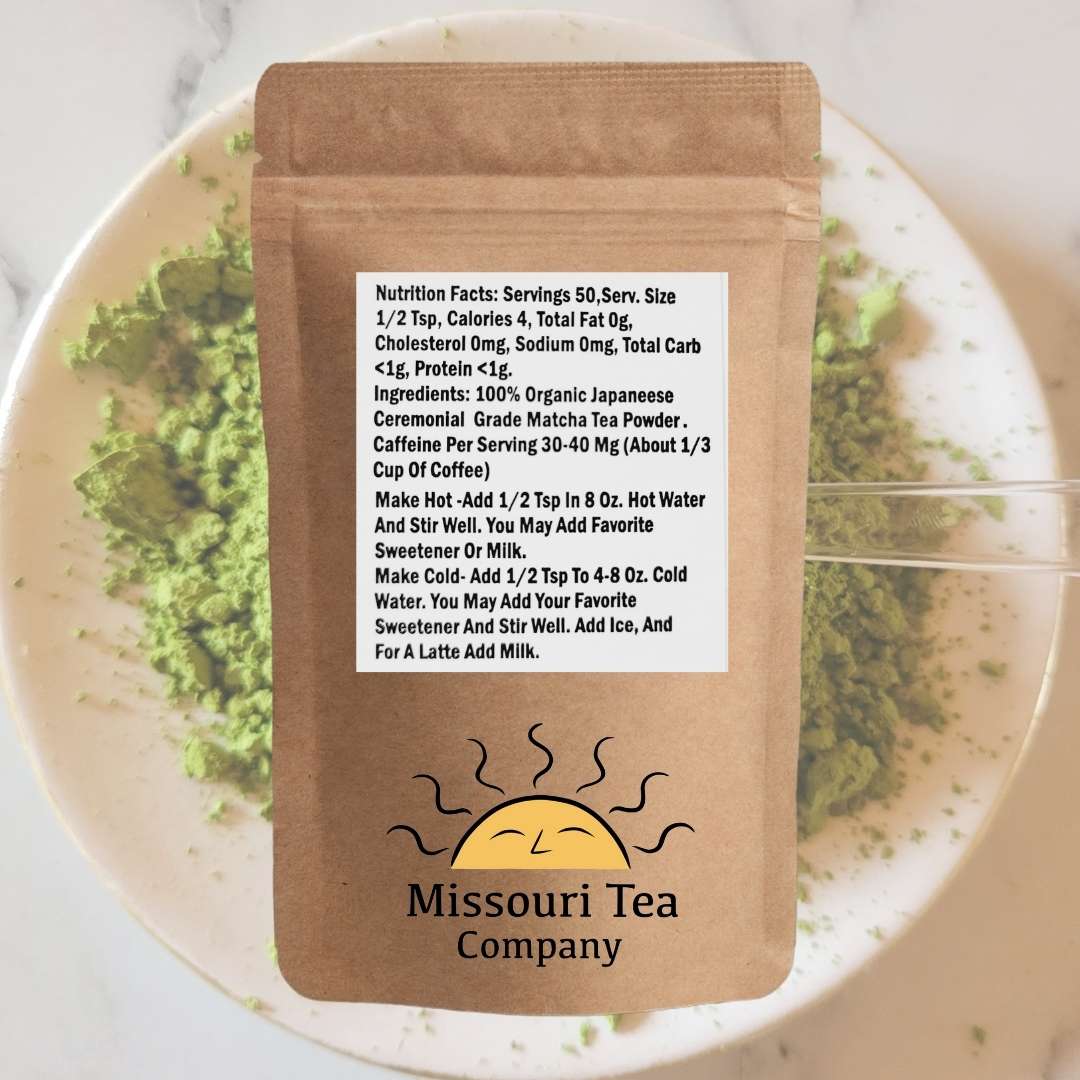The Missouri Tea Company
Ceremonial Organic Matcha Tea
Ceremonial Organic Matcha Tea
Regular price
$41.00 AUD
Regular price
Sale price
$41.00 AUD
Unit price
per
Shipping calculated at checkout.
Couldn't load pickup availability
Ceremonial grade matcha provides a natural boost of energy and antioxidants, perfect for a healthier lifestyle. Give your body and mind the support they need with our premium quality organic matcha. This is 1.0 OZ net weight
Our Certifications









Matcha is the most talked about tea around, and for good reason. It is healthy, delicious, and can be meditative to prepare. It can be used as a quiet morning meditation, or a late-morning boost of motivation. Matcha is quite versatile and can also be made into lattes, cocktails, and used in cooking and baking.
on matcha history
Grinding tea was popular in China during the Song Dynasty and was widely consumed this way before it became popular in Japan. Powdered green tea was brought over to Japan in the 12th century by Buddhist monks. The tea was revered for its meditative yet invigorating properties. Samurai warriors started drinking matcha before battle for focus and energy. The ceremony of carefully preparing matcha was developed in Japan in the 13th century and is referred to as Chanoyu. It is a precise, meditative art of preparing the tea, and tea masters study chanoyu their entire lives. It is a method of preparing tea, but also a way of life. Powdered tea eventually grew out of fashion in China but Japan has kept the tradition alive.
on matcha making
Matcha Japanese tea leaves are ‘shade grown’. This means the tea plants are covered with a canopy for 3-4 weeks before they are harvested. This process restricts sunlight to the plants which slows down their growth. The lack of sunlight stimulates the plant to produce more chlorophyll and concentrates the number of vitamins and antioxidants in the leaves. Shade grown teas are a deeper hue of green due to the extra chlorophyll production.
When it’s time to harvest, tea leaves are picked, steamed, dried, graded, and then the stems and leaf veins are removed to create a loose-leaf tea called ‘tencha’. The tencha is then ground into a powder. The grinding process must be done with special stones and ground slowly. If ground too quickly, too much heat will be generated and ruin the integrity of the beautiful leaves.
on matcha types
There are two main categories of matcha herb: Ceremonial Grade and Culinary Grade.
Ceremonial grade matcha is higher quality and is suitable to be used for tea ceremonies. It is ground using the special stone mills and is harvested earlier, containing younger leaves and buds. The concentration of the amino acids in the younger tea creates a sweeter brew. If you’re looking to prepare matcha on its own without adding anything to it, a ceremonial grade is recommended. You’ll get the most vibrant, flavorful brew
on matcha history
Grinding tea was popular in China during the Song Dynasty and was widely consumed this way before it became popular in Japan. Powdered green tea was brought over to Japan in the 12th century by Buddhist monks. The tea was revered for its meditative yet invigorating properties. Samurai warriors started drinking matcha before battle for focus and energy. The ceremony of carefully preparing matcha was developed in Japan in the 13th century and is referred to as Chanoyu. It is a precise, meditative art of preparing the tea, and tea masters study chanoyu their entire lives. It is a method of preparing tea, but also a way of life. Powdered tea eventually grew out of fashion in China but Japan has kept the tradition alive.
on matcha making
Matcha Japanese tea leaves are ‘shade grown’. This means the tea plants are covered with a canopy for 3-4 weeks before they are harvested. This process restricts sunlight to the plants which slows down their growth. The lack of sunlight stimulates the plant to produce more chlorophyll and concentrates the number of vitamins and antioxidants in the leaves. Shade grown teas are a deeper hue of green due to the extra chlorophyll production.
When it’s time to harvest, tea leaves are picked, steamed, dried, graded, and then the stems and leaf veins are removed to create a loose-leaf tea called ‘tencha’. The tencha is then ground into a powder. The grinding process must be done with special stones and ground slowly. If ground too quickly, too much heat will be generated and ruin the integrity of the beautiful leaves.
on matcha types
There are two main categories of matcha herb: Ceremonial Grade and Culinary Grade.
Ceremonial grade matcha is higher quality and is suitable to be used for tea ceremonies. It is ground using the special stone mills and is harvested earlier, containing younger leaves and buds. The concentration of the amino acids in the younger tea creates a sweeter brew. If you’re looking to prepare matcha on its own without adding anything to it, a ceremonial grade is recommended. You’ll get the most vibrant, flavorful brew
***WE INCLUDE THE MEASURING SPOON***
Materials
Materials
Dimensions
Dimensions
Care information
Care information






